#Israeli cuisine
Text

Roasted Eggplant Sabich with Red Pepper Hummus (Vegan)
#vegan#breakfast#lunch#israeli cuisine#iraqi cuisine#middle eastern cuisine#west asian cuisine#wraps#sabich#pita#eggplant#bell peppers#cabbage#cucumber#tomatoes#mint#oregano#lemon#paprika#garlic powder#hummus#chickpeas#tahini#garlic#olive oil#sea salt
47 notes
·
View notes
Link
Last week, I attended the International Food Festival in Shusha, together with a group of 10 Israeli journalists and bloggers. We watched Azerbaijani theatrical shows, listened to Azerbaijani music, participated in traditional Azerbaijani dances, and ate food from many regions of Azerbaijan as well as other countries, including Malaysia, Georgia, Turkey, France, Italy, China, Japan, and Israel.
Shusha is a city in Azerbaijan, in the region of Nagorno-Karabakh, where two large-scale conflicts took place between Azerbaijan and its neighbor Armenia. Located at a high altitude, the city was a mountain resort during the Soviet era.
Advertisement
Milana Amirgulova, a member of Azerbaijan’s Mountain Jewish community, supervised the Israel table at the festival. “I am very proud to represent my historical motherland and my real motherland,” she told me. “We prepared three dishes: hummus and pita, a Mountain Jewish dish of chicken and rice for the main course, and cherry strudel for dessert, which was adopted by the Ashkenazi Jewish community in Europe.”
Milana was invited to represent Israel at the festival by the Azerbaijani Tourism Board. “A couple of weeks ago, we had Israeli Food Week held by Azerbaijani Home Chef,” she explained. “I was the first-place winner with the Arabic maqluba dish that’s popular in Israel. I received a free ticket to Israel and an invitation from Israeli ambassador George Deek to participate in the food festival.”
10 notes
·
View notes
Text
B’ivrit, 1173 ½ Cypress Ave, Los Angeles (Cypress Park), CA 90065

Charming vegan Israeli street food spot – it’s an outdoor patio and with an outdoor kitchen. The spot is so small that their fryers are small. The menu only have a few items: falafel pita or bowl, cauliflower shawarma pita, sabich pita, hummus, and drinks. There’s also a weekly soup. Everything seems to be made from scratch except for the pitas, which are sourced from a local Israeli bakery. They were out of cauliflower shawarma during my visit.
Order at the counter and they’ll bring your food to you when it’s ready. During my visit, there was only one employee who had to do everything. It took almost 20 minutes to get my food and they weren’t busy. Two people ordered after me and were still waiting after I finished eating. The falafel is made to order.
Sabich pita ($15): eggplant, potato, pita, Israeli salad, tahini, hummus, spicy schoog, and pickled veg. The thick pita helps fill you up. The pillowy pita bread was excellent. The filling was tasty – slices of soft grilled eggplant, fried potato slices (some parts were as crunchy as a potato chip), salad and sauce on top, sour pickled veggies and a spicy green schoog on the side. The schoog was quite chunky but the flavor was good (jalapenos). The salads were fresh and crunchy.
Falafel bowl ($14): 8 falafel balls, tahini, cabbage salad, Israeli salad, spicy schoog, pickled veg and a pita. Mr. Froyo enjoyed the flavor of the falafel. I thought most of the falafel balls were overfried and way too crunchy. Some pieces didn’t even have a moist center but just seemed like a disc of crunchy batter. But one piece with a yellow batter was very good. The falafel balls had different colors and flavors.
There’s a self-serve station where you can help yourself to water, pickles, tahini, napkins, and utensils. As for seating, there are 6 tables, benches, and a counter. They can probably seat 24 people.
3.5 out of 5 stars.
By Lolia S.
#B'ivrit#Israeli street food#Israeli cuisine#falafel#hummus#vegan food#vegan restaurant#pita sandwiches#Cypress Park
0 notes
Text
The Jewish mark on iconic Irish cuisine:
Corned Beef and Cabbage is a popular dish among Americans on St. Patricks Day. Traditionally, in Ireland, cabbage was and is paired with pork bacon.
However, during the 19th century, as Irish immigrants moved to the U.S., they discovered there was a lower-cost meat alternative to pork. It was their Jewish neighbors who introduced the cured meat and Kosher butchers to the community when they noticed some similarities in the two salty meats. Cooking the corned beef together with cabbage proved to be a low-cost and delicious solution; and the rest is history.
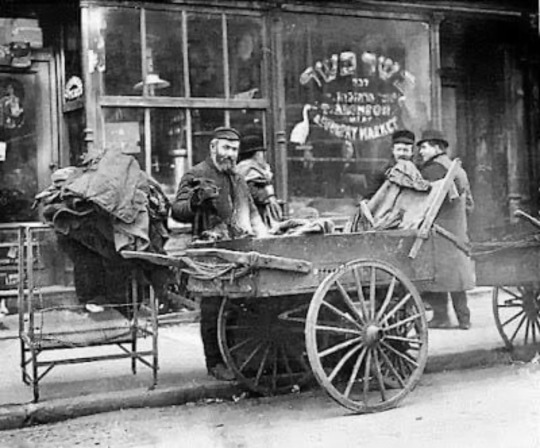
#irish#Irish antisemitism#antisemitism#israel#secular-jew#jewish#judaism#israeli#jerusalem#diaspora#secular jew#secularjew#islam#corned beef and cabbage#corned beef#cabbage#jewish history#lower East side#cuisine#food#Irish food#Irish cuisine#st patricks day#st pattys day
103 notes
·
View notes
Text
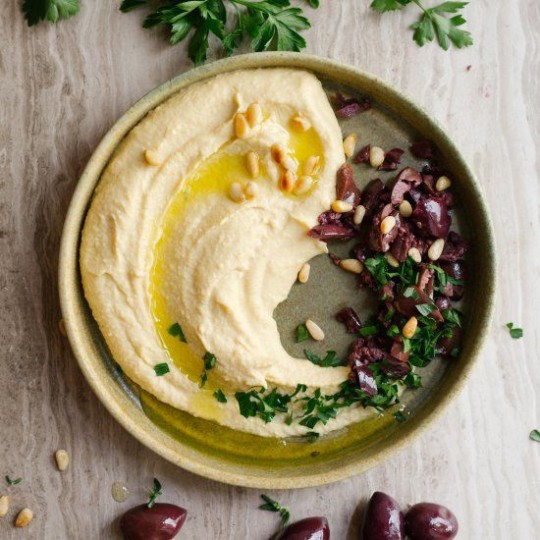
#israeli#food#middle eastern#cuisine#hummus#recipe#yotam ottolenghi#jerusalem#israel#middle east#peaceful dwellings
12 notes
·
View notes
Text
yeaa no there is no such thing as an "Israeli dish" and, actually, no such thing as "Israeli culture" either unless you count chauvinism lmao.... yes Jews have existed in the region forever and have had their own traditions and cuisines but that has never meant that these cultural practices or dishes will suddenly and magically become "Israeli" and not "Moroccan Jewish" or "Iraqi Jewish" or "Syrian Jewish", you get what I mean don't you?
11K notes
·
View notes
Text
Meat the Future: Israel's 3D-Printed Culinary Revolution!
Israeli Company Pioneers the Future: Printing Meat!
In the bustling landscape of technological innovations, Israel has always been at the forefront. This time, it’s not about cyber-security, AI, or drones but something that touches a basic human need – food. An Israeli company has created ripples in the culinary world by introducing a groundbreaking method to ‘print’ meat. Yes, you read that…
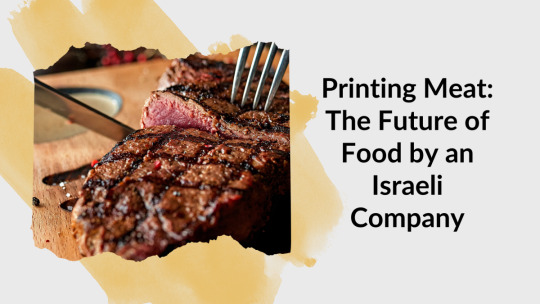
View On WordPress
#3D Printed Meat#Culinary Innovation#Eco-Friendly Cuisine#Future Of Food#Gastronomy Genius#Israeli Tech#Meat Revolution#Sustainable Eating#Tech Meets Taste
0 notes
Text
In the past 24 hours, I learned that the IOF freezes the dead bodies of imprisoned Palestinian people and keeps them in fridges so they can "serve out their sentences."
I also learned that multiple Israeli environmental organizations and interconnections worked to BAN herbs that are an intrinsic part of Palestinian cuisine, and despite it being overturned, they diligently STILL tried to.
On top of that, IOF soldiers recently looted over (what I saw reported on Al Jazeera) just over one million dollars in jewelry/goods -by robbing Palestinian homes in Gaza for THEIR IOF 'treasury.' I also saw the story about one silver necklace that was stolen by IOF scum for HIS girlfriend (of which he bragged about on social media) -only to find out it belonged to a Palestinian woman, who was supposed to wear this on her wedding day -she was killed during an IOF bombing.
When I say the IOF is one of the world's embodiment of evil incarnate and exemplar of moral depravity, this is just the tip of the iceberg because this is just beyond insidious.
#feminist#feminism#social justice#freepalastine🇵🇸#palestine#free palestine#israel is committing genocide#israel is a terrorist state#free gaza#from the river to the sea palestine will be free#death tw
7K notes
·
View notes
Text
The Palestinian Table
This is from one of my favourite podcasts, and one of the best interviewers, Terry Gross, ‘as little as life’ is the way she explains her 4’11” stature, interviews, Reem Kassis, the author of the Palestinian Table, a cookbook, and The Arabesque Table, listen and enjoy. It’s all about food, or is it?Fri, Oct 28, 2022 1:59PM • 43:24
SPEAKERS
Terry Gross, Reem Kassis, 4PR – Voice of the…
View On WordPress
#arab#bagels#book#called#country#cuisine#dish#eating#family#food#home#israeli#mother#olive oil#originated#palestinian#people#recognize#restaurant
0 notes
Text
When my life journey took me to Italy, even the mere glimpse of an Israeli flag flying over a food stall in the city of Varese would provoke me. “This is our food!” I told my colleague. “Israelis can sell mujaddara, hummus, maqlubeh and falafel, but they cannot declare them their property!” As if stealing the land, water, and air were not enough?! This food is part of our identity and culture. For me as a Palestinian, each plate has a story that relates to my people, the state, and the fragrances of my homeland.
Israel uses food to claim ownership of the territory and encourage tourism, not only internally but also abroad, featuring it in advertisements and in articles published in international newspapers and world-famous magazines. Israeli chefs present huge events in which they appropriate Palestinian cuisine and our cultural foods, denying the origins of these foods and pretending that they are theirs. As Israelis proclaim ownership of plates whose origins lie in the Middle East, the Levant, or even Egypt, they deny the existence of the people who live on this land and whose dishes and recipes are much older than the state of Israel.
Someone as tenacious as I cannot let this go by unchallenged. Instead, I have decided to use food as a soft power tool to fight the occupation. Food has become my means to speak about Palestine.
Historically, cuisine has been a mirror of civilization, culture, heritage, and the economic status of a people. Likewise, Palestinian dishes reflect all these aspects and elements. Take musakhan, for example, a Palestinian farmer’s dish that traditionally has been cooked during the olive harvest season: tabun bread is drenched in olive oil, covered with onions that have been caramelized in olive oil, and topped with sumac. All these ingredients are the fruit of Palestinian land. As living standards rose, chicken was added, then toasted almonds and pine nuts were sprinkled on top. But despite these changes, the dish has kept its original flavors as its essence has been passed down from generation to generation, preserving the authenticity of the dish.
Our occupiers can take possession of our food in the material sense, as they have done and continue to do with our land. But they cannot transmit its history, traditions, and associated sentiments because we Palestinians consider our food to be a thread that brings us together and connects us to our homeland – especially those of us who live in the diaspora.
It is no coincidence that many Palestinian poets and writers talk about food when they express their longing for their homeland. The famous Palestinian poet Mahmoud Darwish, for example, wrote while in exile, “Dearly I yearn for my mother’s bread, my mother’s coffee.”
Food is part of Palestinian identity wherever we go. It reflects our culture, heritage, and personality.
– Fidaa Abuhamdiya, "The Soft Power of Palestinian Food." This Week in Palestine Issue 286, February 2022. Palestinian Cuisine: From Tradition to Modernity. p. 57.
1K notes
·
View notes
Text
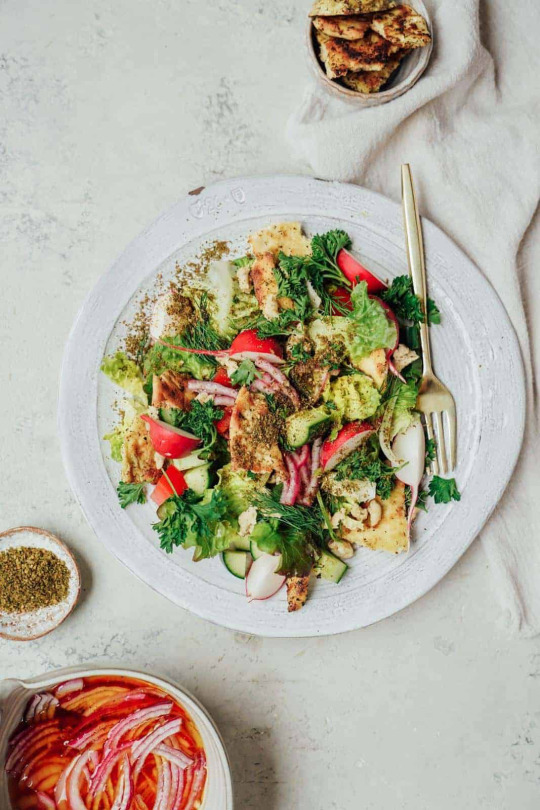
Vegan Israeli Fattoush Salad with Pickled Red Onions
#vegan#appetizer#israeli cuisine#middle eastern cuisine#west asian cuisine#salad#fattoush#radishes#lettuce#cucumber#red onion#pickles#tomatoes#dill#pita chips#za'atar#sumac#lemon#olive oil
6 notes
·
View notes
Text
June was working at the Goldie restaurant in Philadelphia on Sunday night when protesters started assembling outside the Israeli-American-owned eatery waving Palestinian flags.
"Goldie, Goldie, you can't hide, we charge you with genocide," they chanted.
The 24-year-old June, who asked to be identified by his first name only, told Middle East Eye that they watched the rally through the window of the restaurant which sells falafel, hummus and other Middle Eastern cuisine. June was shift-leading at the time.
"I remember thinking it was a big crowd, given it had been raining," June said.
"No one inside was bothered. I didn't feel unsafe. There were orthodox Jews taking part in the protest. We even had a customer come into the business," June, who is also Jewish, added.
After a few minutes, the protesters left.
When June went home after the shift, they found social media alight with accusations that the crowd had targeted the restaurant because it was a Jewish establishment.
But June says they knew that this wasn't a case of antisemitism.
"The protesters had assembled outside Goldie because the restaurant owner had sent money to an aid organisation that supported the Israeli military. They had come because two employees at Goldie were fired for expressing support for Palestine," June told MEE.
Outraged by the feverish pace with which the false narrative of a marauding mob intimidating a business on account of their Jewishness was being amplified on the internet and the news media, June posted on social media in support of the protesters.
"If you don't want to be directly funding genocide, stay away from Goldie, Kfar, Federal Donuts, Laser Wolf or Zahav. Goldie's parent company CookNSolo held a fundraiser where sales from all their restaurants went to an org [sic] that gives supplies to the IDF [Israeli military]," June wrote.
On the way to work the next morning, June received a call from the restaurant. They were told that they were no longer needed and they was fired with immediate effect.
That made June the third person at Goldie to be fired on account of their pro-Palestinian advocacy since 7 October when Israel's war on Palestine began.
Since late Sunday, the US media, prominent Jewish Americans, Philadelphia's mayor, several lawmakers, and even the White House have issued statements condemning the protests outside the restaurant.
"This is idiotic and dangerous. Protest outside the Israeli consulate or the offices of your member of Congress, not Jewish or Israeli-owned restaurants," prominent Jewish-American writer Peter Beinart wrote.
Likewise, Andrew Bates, a White House spokesperson, described the incident as "antisemitic and completely unjustifiable to target restaurants that serve Israeli food over disagreements with Israeli policy".
On Tuesday, US Vice President Kamala Harris' husband, Doug Emhoff, called Michael Solomonov, the owner of the restaurant group, to express support for his business.
But former employees at Goldie as well as pro-Palestine advocates who either organised or participated in the protest say the outrage was manufactured to distract from both the crimes of the Israeli state and those who have chosen to support it.
"While Goldie was not the goal of our protest, we briefly paused and led chants [outside the restaurant] because the owner, Michael Solomonov, has used proceeds from the restaurant to fund an organisation that works directly with the Israeli Occupational forces," Natalie Abulhawa, a spokesperson from the Philly Palestine Coalition, said.
Abulhalwa said that the group spent only a few minutes outside the restaurant and moved on to other stops before continuing the rally.
"We also stopped at Starbucks for the same reason and then continued to march. Our march was roughly three hours long and we stopped at Goldie's for four minutes, at most," Abulhalwa added.
June, who was at the business at the time, confirmed to MEE that the protesters were only around for a few minutes.
Sophie Hamilton, who worked at Goldie for more than two years, including as a store manager, confirmed to MEE that Solomonov had held a fundraiser in mid-October, where $100,000 was raised for United Hatzalah, an Israeli emergency aid organisation based in Jerusalem.
She said Goldie, part of the CooknSolo company, was not some small-time "mom-and-pop" business, but a sprawling company whose owner was appointed by the Israeli tourism ministry as its culinary ambassador for Israel in 2017. Solomonov is an Israeli chef who owns four restaurants in the Philadelphia area under the CookNSolo banner.
According to a statement released by the Israeli authorities at the time, the role was designed "to champion Israel’s extraordinarily diverse and vibrant culinary landscape".
Hamilton said the company had mischaracterised United Hatzalah to staff as "non-partisan, non-military aligned, like the Red Cross", when a cursory internet search showed that not only did the charity openly collaborate with the Israeli military, they also spoke like an arm of the Israeli state.
"The influx of terrorists infiltrating Israeli territory and the resulting high number of injured individuals also prompted United Hatzalah to provide additional medical supplies and protective equipment to IDF teams on the ground," a statement issued in late October by United Hatzalah, reads.
"Since the beginning of the war, United Hatzalah medical teams have treated over 3,000 soldiers and civilians and provided more than 900 soldiers, civilians, and volunteers with psychological first aid. The organization also delivered over 30 tons of medical supplies and humanitarian aid to the IDF and residents of southern Israel," the statement added.
Hamilton said when she had discovered the information, she refused to take part in the fundraiser because she didn't want to be complicit in the genocide of Palestinians.
However, when she returned to work after the fundraiser, she said she still wanted to show solidarity with Palestinians and decided to wear a pin bearing the Palestinian flag on her shirt.
A few days later, the company came out with a new policy that banned any pin or patch unrelated to the store on their uniforms.
"I wore the pin anyway in defiance of the policy and I was sent home that day," Hamilton says.
When she returned to work, she decided she needed the job and abided by the policy. But when one of her colleagues, Noah Wood, refused to take off his pin, and she wouldn't discipline him as his manager, she was fired. And so was he.
"I would never, as a manager censor someone I work with for showing their heartfelt belief in human rights," Hamilton said.
Wood, who had already resigned from his job on account of the suppression of Palestinian advocacy at the restaurant, was serving his notice period at the time when he was told to stay home.
He told MEE that it appears a customer complaint may have led to his dismissal.
"We've had LGBTQ flags up in the store. They might still be up. And one of the other locations had Black Lives Matter signage, so it wasn't as if it was an entirely politically neutral work environment," Wood said.
"You must remember Sophie and I didn't say anything. We didn't argue with customers. We weren't posting online. We were just wearing Palestine patches and pins and this seemed to make a customer uncomfortable, and this was enough for termination," he added.
Goldie and its parent company, CookNSolo, did not immediately reply to MEE's request for comment.
Activists say they remain appalled by the smear campaigns pitted against Palestinians on a daily basis. The rush to defend a business working with the Israeli army under the mask of an antisemitic attack was in line with the higher echelons of the American state to equate criticism of Israel with antisemitism, they say.
With the devastation in Gaza spiralling and the death toll ever increasing - now upwards of 16,000 Palestinians - organisers say the rapid resort to smear those who dare to raise the plight of Palestinians was the surest sign that officials had run out of excuses to justify the support of Israel.
Activists say the flurry of support for the Israeli-owned business also showed the close ties between the US political establishment and Israel-aligned businesses.
"The hypocrisy of our elected officials is despicable. Within a couple hours of our protest, Pennsylvania's Governor Josh Shapiro and others ran to Twitter to accuse us of antisemitism with absolutely no context and no facts," Abulhalwa, with the Philly Palestine Coalition, said.
"No one from their offices reached out to us to 'investigate'," Abulhalwa added.
Organisers said US politicians were constantly attempting to portray pro-Palestinian protesters as unhinged or violent when it was the US state that was supporting genocide in Gaza and it was Palestinians in the US who have either been killed or physically attacked.
In its report about the call made by Emhoff, the US vice president's husband, to Solomonov, the owner of Goldie, NBC News reported that the duo spoke about "how food was actually supposed to bring people together rather than be a source of division"
Likewise, Pennsylvania's Governor Shapiro, who was among the first to condemn the protests outside Goldie, baked bread with its owner, Solomonov, as recently as September.
"Being an Israeli ambassador is a big part of Solomonov's brand," Leila, a Jewish-American who took part in the protest outside Goldie on Sunday, said.
Leila, who offered only her first name to MEE, said the suggestion that any part of the action outside the restaurant may have been construed as antisemitic was simply absurd.
June, the former employee at Goldie, who had watched the protest from inside the store itself, said the charge of antisemitism was divorced from reality.
"They didn't come to the restaurant simply because it was Jewish-owned. If that was the case, they would've gone to hundreds of restaurants across the city," June said.
Likewise, Abuhalwa said the smears against Palestinians were once more exposing a double standard toward Palestinian life.
"Palestinian protesters being held at gunpoint by a racist, Islamophobe is a hate crime. Palestinians being shot for wearing keffiyehs is a hate crime. A grown man stabbing a little boy for being Muslim is a hate crime. Using your First Amendment rights and peacefully protesting is not a hate crime.
"They accused us of targeting Goldie because it's Jewish-owned, which is far from the truth. Solomonov is not being targeted due to his religious beliefs, but rather his ties to a violent apartheid state that is currently enacting a genocide," Abuhalwa added.
Meanwhile, June, the 24-year-old who lost his job at Goldie for supporting the protesters, says he has no regrets.
"If I could educate more people on how this company feels about Palestinians being killed, I'd gladly do it in a heartbeat," June said.
"I will always advocate and support anyone who advocates for a ceasefire and an end to the occupation of Palestine," they added.
#palestine#bds#lmao#the way people are fully defending corporations#but anyways im sharing this so you know who else to add to your bds list if you need
843 notes
·
View notes
Text
Let's talk about Israeli cuisine.
Unfortunately, I have less experience with it than I should, as it looks absolutely delicious, but I've never had any. Diaspora Jew in a place with few Jews or Israelis moment :(. And I'm talking less about Israeli cuisine and more about how it's perceived--namely how it's taken from Israelis, denigrated as 'not Israeli', as having been 'stolen' from Arab cuisine as a part of a broader project of 'cultural conquest'. Looking at you, Joseph Massad.
This assertion is not only a bald-faced lie, it is also deeply antisemitic. People have the right to make food. Nobody's going to call a non Italian racist for making or eating Italian food. Nor would an Italian be culturally appropriating if they eat sushi. Yet Jews and Israelis are stealing if they make Middle Eastern food?
More than that, though, it ignores Jewish history. Jews have lived in the Middle East for... as long as homo sapiens have lived in the Middle East? Mizrahim, who make up most of Israel's population, did not grow out of the ground in Israel from 1948-1979. They were expelled, violently chased out of the Muslim-majority countries they had lived for millennia. Before then, they sustained themselves on falafel, couscous, hummus, tahini, halva, shawarma, and every Middle Eastern food under the sun. If there were such a thing as the 'right' to make food, they'd absolutely have it.
But it's instead 'colonization', 'cultural appropriation', and 'cultural conquest'? To bring the culinary practices they and their ancestors had been practicing since Judaism began to the only country that had thrown open their doors to them? After experiencing pogroms, riots, anti-Jewish legislation, the world once sat by and did nothing to stop it. Again. And then members of these countries have the gall--the audacity and sheer disrespect--to accuse them of pilfering their own fucking culture?? After violently kicking them out???
Like, it blows my mind how many injustices Israelis are subjected to by moronic protestors who think 'Zionism is racism' or whatever. Every time someone posts about Zionist colonization of Palestinian food and culture, they're ironically themselves indulging in cultural erasure. The fact that Palestinians often make the same foods isn't indicative of a supposed Zionist plot to exterminate Palestinians and steal their culinary practices, but rather reflective of their shared origins as being Middle Eastern. But these online 'activists' don't care--nor do they care that the implied 'Zionist plot' that runs through their claims is textbook antisemitism.
Middle Eastern food is widespread in Middle Eastern countries. When Middle Eastern people get kicked out of Middle Eastern countries and go to another Middle Eastern country, they make... Middle Eastern food. Shocking, I know.
It isn't stealing. It isn't cultural appropriation.
Now, gut shabbos everyone.
495 notes
·
View notes
Text
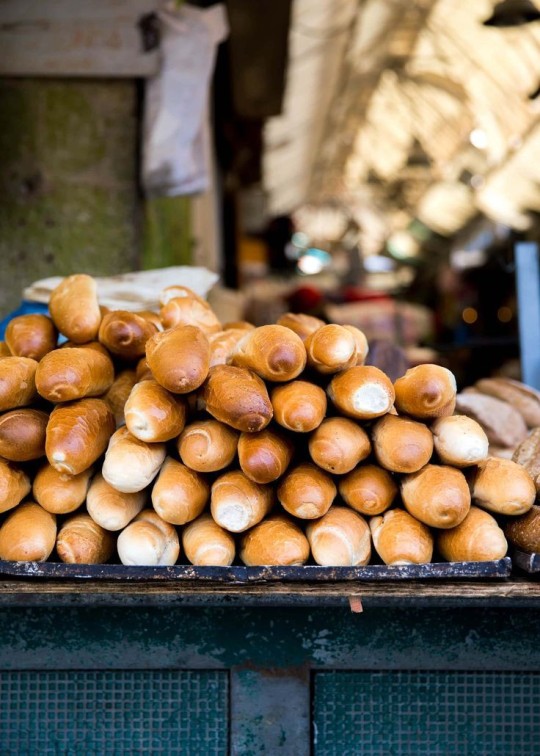
#israeli#food#middle eastern#cuisine#bread market#bread#loaves#french bread#baguette#israel#middle east
6 notes
·
View notes
Text
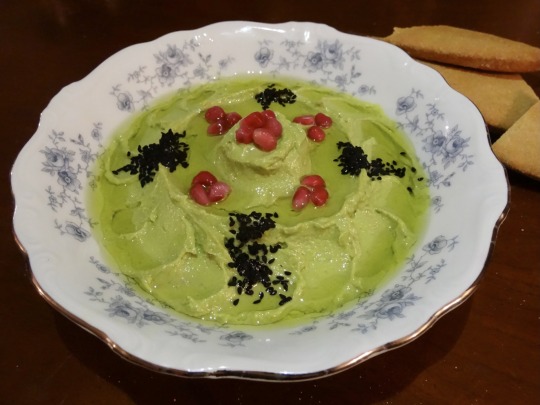
[ID: A bowl of avocado spread sculpted into a pattern, topped with olive oil and garnished with symmetrical lines of nigella seeds and piles of pomegranate seeds; a pile of pita bread is in the background. End ID]
متبل الأفوكادو / Mutabbal al-'afukadu (Palestinian avocado dip)
Avocados are not native to Palestine. Israeli settlers planted them in Gaza in the 1980s, before being evicted when Israel evacuated all its settlements in Gaza in 2005. The avocados, however, remained, and Gazans continued to cultivate them for their fall and winter harvest. Avocados have been folded into the repertoire of a "new" Palestinian cuisine, as Gazans and other Palestinians have found ways to interpret them.
Palestinians may add local ingredients to dishes traditionally featuring avocado (such as Palestinian guacamole, "جواكامولي فلسطيني" or "غواكامولي فلسطيني"), or use avocado in Palestinian dishes that typically use other vegetables (pickling them, for example, or adding them to salads alongside tomato and cucumber).
Another dish in this latter category is حمص الافوكادو (hummus al-'afukadu)—avocado hummus—in which avocado is smoothly blended with lemon juice, white tahina (طحينة البيضاء, tahina al-bayda'), salt, and olive oil. Yet another is متبّل الأفوكادو (mutabbal al-'afukadu). Mutabbal is a spiced version of بابا غنوج (baba ghannouj): "مُتَبَّل" means "spiced" or "seasoned," from "مُ" "mu-," a participlizing prefix, + "تَبَّلَ" "tabbala," "to have spices added to." Here, fresh avocado replaces the roasted eggplant usually used to make this smooth dip; it is mixed with green chili pepper, lemon juice, garlic, white tahina, sumac, and labna (لبنة) or yoghurt. Either of these dishes may be topped with sesame or nigella seeds, pomegranate seeds, fresh dill, or chopped nuts, and eaten with sliced and toasted flatbread.
Avocados' history in Palestine precedes their introduction to Gaza. They were originally planted in 1908 by a French order of monks, but these trees have not survived. It was after the Balfour Declaration of 1917 (in which Britain, having been promised colonial control of Palestine with the dissolution of the Ottoman Empire after World War 1, pledged to establish "a national home for the Jewish people" in Palestine) that avocado agriculture began to take root.
In the 1920s, 30s, and 40s, encouraged by Britain, Jewish Europeans began to immigrate to Palestine in greater numbers and establish agricultural settlements (leaving an estimated 29.4% of peasant farming families without land by 1929). Seeds and seedlings from several varieties of avocado were introduced from California by private companies, research stations, and governmental bodies (including Mikveh Israel, a school which provided settlers with agricultural training). In these years, prices were too high for Palestinian buyers, and quantities were too low for export.
It wasn't until after the beginning of the Nakba (the ethnic cleansing of Palestinians from "Jewish" areas following the UN partition of Palestine in 1947) that avocado plantings became significant. With Palestinians having been violently expelled from most of the area's arable land, settlers were free to plant avocados en masse for export, aided (until 1960) by long-term, low-interest loans from the Israeli government. The 400 acres planted within Israel's claimed borders in 1955 ballooned to 2,000 acres in 1965, then 9,000 by 1975, and over 17,000 by 1997. By 1986, Israel was producing enough avocados to want to renegotiate trade agreements with Europe in light of the increase.
Israeli companies also attained commercial success selling avocados planted on settlements within the West Bank. As of 2014, an estimated 4.5% of Israeli avocado exports were grown in the occupied Jordan Valley alone (though data about crops grown in illegal settlements is of course difficult to obtain). These crops were often tended by Palestinian workers, including children, in inhumane conditions and at starvation wages. Despite a European Union order to specify the origin of such produce as "territories occupied by Israel since 1967," it is often simply marked "Israel." Several grocery stores across Europe, including Carrefour, Lidl, Dunnes Stores, and Aldi, even falsified provenance information on avocados and other fruits in order to circumvent consumer boycotts of goods produced in Israel altogether—claiming, for example, that they were from Morocco or Cyprus.
Meanwhile, while expanding its own production of avocados, Israel was directing, limiting, and destabilizing Palestinian agriculture in an attempt to eliminate competition. In 1982, Israel prohibited the planting of fruit trees without first obtaining permission from military authorities; in practice, this resulted in Palestinians (in Gaza and the West Bank) being entirely barred from planting new mango and avocado trees, even to replace old, unproductive ones.
Conditions worsened in the years following the second intifada. Between September of 2000 and September of 2003, Israeli military forces destroyed wells, pumps, and an estimated 85% of the agricultural land in al-Sayafa, northern Gaza, where farmers had been using irrigation systems and greenhouses to grow fruits including citrus, apricots, and avocados. They barred almost all travel into and out of al-Sayafa: blocking off all roads that lead to the area, building barricades topped with barbed wire, preventing entry within 150 meters of the barricade under threat of gunfire, and opening crossings only at limited times of day and only for specific people, if at all.
A July 2001 prohibition on Palestinian vehicles within al-Sayafa further slashed agricultural production, forcing farmers to rely on donkeys and hand carts to tend their fields and to transport produce across the crossing. If the crossing happened to be closed, or the carts could not transport all the produce in time, fruits and vegetables would sit waiting in the sun until they rotted and could not be sold. The 2007 blockade worsened Gaza's economy still further, strictly limiting imports and prohibiting exports entirely (though later on, there would be exceptions made for small quantities of specific crops).
In the following years, Israel allowed imports of food items into Gaza not exceeding the bare minimum for basic sustenance, based on an estimation of the caloric needs of its inhabitants. Permitted (apples, bananas, persimmons, flour) and banned items for import (avocados, dates, grapes) were ostensibly based on "necessary" versus "luxury" foods, but were in fact directed according to where Israeli farmers could expect the most profit.
Though most of the imports admitted into Gaza continued to come from Israel, Gazan farmers kept pursuing self-sufficiency. In 2011, farmers working on a Hamas-government-led project in the former settlements produced avocados, mangoes, and most of the grapes, onions, and melons that Gazans ate; by 2015, though still forbidden from exporting excess, they were self-sufficient in the production of crops including onions, watermelon, cantaloupe, grapes, almonds, olives, and apples.
Support Palestinian resistance by calling Elbit System’s (Israel’s primary weapons manufacturer) landlord, donating to Palestine Action’s bail fund, and donating to the Bay Area Anti-Repression Committee bail fund.
Ingredients:
2 medium avocados (300g total)
1/4 cup white tahina
2 Tbsp labna (لبنة), or yoghurt (laban, لبن رايب)
1 green chili pepper
2 cloves garlic
2 Tbsp good olive oil
Juice of 1/2 lemon (1 1/2 Tbsp)
1 tsp table salt, or to taste
Pomegranate seeds, slivered almonds, pine nuts, chopped dill, nigella seeds, sesame seeds, sumac, and/or olive oil, to serve
Khubiz al-kmaj (pita bread), to serve
Instructions:
1. In a mortar and pestle, crush garlic, pepper, and a bit of salt into a fine paste.
2. Add avocados and mash to desired texture. Stir in tahina, labna, olive oil, lemon juice, and additional salt.
You can also combine all ingredients in a blender or food processor.
3. Top with a generous drizzle of olive oil. Add toppings, as desired.
4. Cut pita into small rectangles or triangles and separate one half from the other (along where the pocket is). Toast in the oven, or in a large, dry skillet, stirring occasionally, until golden brown. Serve dip alongside toasted pita chips.
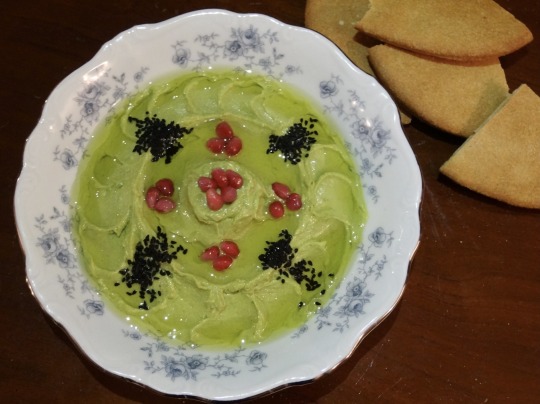
455 notes
·
View notes
Text
17 November 2021
677 notes
·
View notes